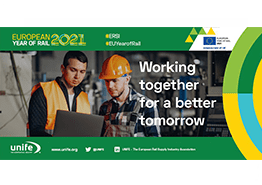Adapting training and attracting talent for the European Rail Supply Industry
Faced with an aging population at a time of rapidly proliferating digitalisation, increasing demand for sustainable mobility options and immediate need for economic recovery following the pandemic, the European Rail Supply Industry is taking the initiative when it comes to preparing students, job seekers and transitioning professionals for impactful, rewarding careers in our sector.
On 24 March, UNIFE organised a digital event, as part of its year-long 2021 European Year of Rail series, to discuss with high level industry leaders and researchers from both academia and European institutions the best means of ensuring skills trainings match evolving transport needs and attract talent capable of developing and deploying the next generation of rail.
Responsible for 400.000 direct and indirect jobs, the European Rail Supply Industry is central to the European Union’s aspirations for a swift V-Shape recovery following the COVID-19, predicted by the 2020 World Rail Market Study, and a just, green transition as called for under the EU Green Deal. As the most sustainable form of mass transportation available, rail and its supply industry can be a key facilitator of a decarbonisation of the transport sector – a requisite for a carbon neutral Europe by 2050.
The Hop On For Our Planet communication initiative launched by UNIFE and its members, as well as the recently commenced STAFFER Blueprint for Skills, co-funded by ERASMUS+, are the first steps in raising awareness of exciting careers in rail and reforming curricula across the Union to provide trainings that facilitate the design and deployment of sustainable mobility technologies. Given the appetite demonstrated in the Hop On For Our Planet survey in 6 member states, these efforts are promising short-, medium- and long terms means to that end.
Convening a panel composed of representatives from Organisation for Economic Co-operation and Development (OECD), EU Agency for the Improvement of Living and Working Conditions (Eurofound), the University of Genoa, Siemens Mobility and Burson Cohn & Wolfe (BCW), the participants reflected on the current mismatch of competences that currently existed in the European Rail Supply and the necessity to rectify it to best achieve EU Sustainable and Smart Mobility Strategy goals such as doubling passenger rail and rail freight by 2030 and 2050, respectively. The panel, moderated by Railway Gazette Editor-in-Chief Chris Jackson, agreed that providing avenues for skills acquisition and raising awareness for fulfilling work in our sector were central to our collective success.
Marieke Vandeweyer, Senior Policy Analyst on Vocational Education and Training at the OECD Centre for Skills, stated in her intervention that: "Emerging technology trends are not a threat, but an opportunity. We must embrace a growth mindset and seize the possibilities that they afford."
Tina Weber, Research Manager on Employment at Eurofound, commenting 2020’s impact on skills: "COVID-19 has aggravated labour shortages in sectors that have expanded during the pandemic. This must be corrected as we move towards a sustainable economy."
Angela Di Febbraro, Professor of Transportation Engineering at University of Genoa and STAFFER Coordinator, reiterated the importance of education by saying: "To attract talent and improve gender balance in transport - including rail - we must communicate its value and foster the common passion for trains"
Sabine Schneider, Head of Talent Management at Siemens Mobility, looked to the future of rail by highlighting: "With digitalisation kicking into the work process, it is clear that we need to upskill and reskill to keep people resilient and relevant."
Sara Carrer, Executive Vice President for Europe and Africa at BCW, explained: "European rail is innovative and fit for the green transition, but there is an inconvenient truth that we must attract more STEM-competent people to best deliver on its values."
Philippe Citroën, Director General of UNIFE, concluded the event by saying: “Rail is an essential part of tomorrow’s sustainable future and it is clear that closing the gender and skills gaps will be crucial to its success. The upcoming EU Industrial Strategy will be a power tool in addressing these challenges and positioning rail to best serve as the backbone of tomorrow’s mobility.”
Watch the webinar recording here.
| More information Andrei Ciufu Head of UNIFE Communications andrei.ciufu@unife.org +32 (0)2 626 12 64 Twitter | LinkedIn | Vimeo |
